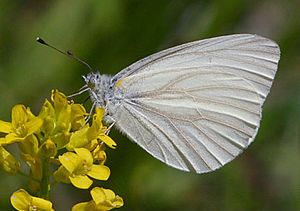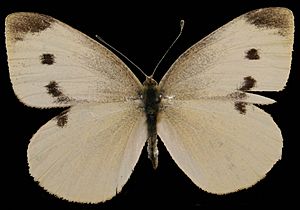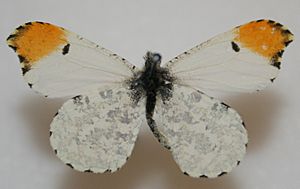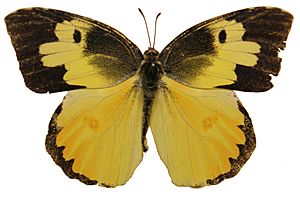List of butterflies of North America (Pieridae) facts for kids
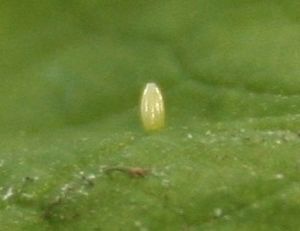
Whites and sulphurs are beautiful small to medium-sized butterflies. They are known for their bright colors, usually white, yellow, or orange, often with some black markings. These butterflies have wingspans that can range from about 0.8 to 4.0 inches (2 to 10.2 cm). There are around 1,000 different types of these butterflies found all over the world, and about 61 species live in North America.
Most whites and sulphurs fly slowly and with a gentle fluttering motion. However, some of the larger species can fly much faster! Both male and female butterflies love to drink nectar from flowers. Male butterflies also enjoy gathering on damp ground, a behavior called mud-puddling, where they get important minerals. When it's time to find a mate, male whites and sulphurs fly around looking for females.
Contents
Life Cycle of Whites and Sulphurs
The eggs of these butterflies are shaped like a spindle and are laid one by one. When the eggs hatch, long, slender larvae (which are caterpillars!) emerge. These caterpillars are usually green or yellow. After growing, the caterpillar changes into a chrysalis (also called a pupa). The chrysalis often looks like a triangle or has a cone-shaped head. It hangs upright, held in place by a silky loop around its middle. How these butterflies overwinter (spend the winter) depends on the specific type. Some might overwinter as a larva, others as a chrysalis, and a few even as an adult butterfly.
Meet the Whites: Subfamily Pierinae
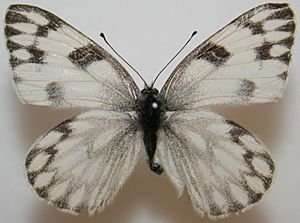
This group of butterflies is called Pierinae, and they are often simply known as "whites." Many of them are indeed white, but some can have other colors too. Here are a few examples of the interesting white butterflies you might find:
- The Checkered white (Pontia protodice) is a common butterfly with checkered patterns on its wings.
- The West Virginia white (Pieris virginiensis) is a delicate white butterfly often found in wooded areas.
- The Cabbage white (Pieris rapae) is one of the most well-known butterflies, often seen in gardens and fields.
- The Falcate orangetip (Anthocharis midea) is a unique white butterfly with bright orange tips on its wings, especially in males.
Meet the Sulphurs: Subfamily Coliadinae
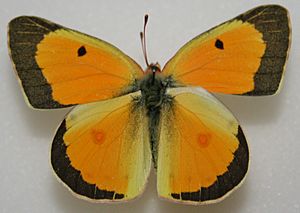
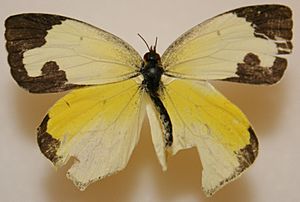
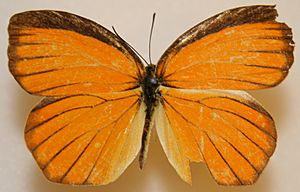
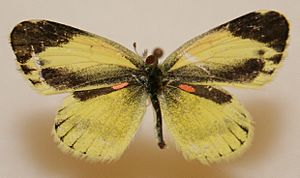
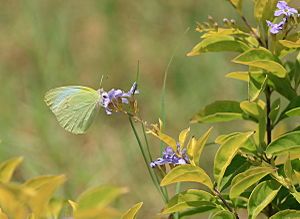
The butterflies in the Coliadinae subfamily are called "sulphurs." They are famous for their vibrant yellow and orange colors. Some even have interesting shapes or patterns. Let's look at some of them:
- The Orange sulphur (Colias eurytheme) is a very common and bright orange butterfly.
- The Southern dogface (Zerene cesonia) gets its name from a dark marking on its wings that looks a bit like a dog's head.
- The Mexican yellow (Eurema mexicana) is a smaller yellow butterfly often found in warmer regions.
- The Tailed orange (Eurema proterpia) has small "tails" on its hindwings and a lovely orange color.
- The Dainty sulphur (Nathalis iole) is one of the smallest sulphur butterflies, living up to its name.
- The Lyside sulphur (Kricogonia lyside) is a pale yellow butterfly that can be found in the southern parts of North America.
Meet the Mimic-Whites: Subfamily Dismorphiinae
This smaller group, Dismorphiinae, includes butterflies sometimes called "mimic-whites." They are known for looking similar to other butterflies, which can help protect them from predators. One example is the Costa-spotted mimic-white (Enantia albania).
 | Leon Lynch |
 | Milton P. Webster |
 | Ferdinand Smith |


